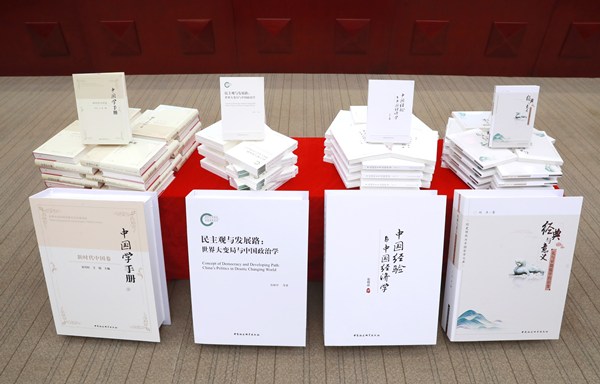
. > WHAT'S NEW > CASS NEWS
CASS contributes to nation’s independent knowledge system
Author : WANG CHUNYAN Source : Chinese Social Sciences Today 2023-05-18

New major research outcomes released by CASS Photo: Zhu Gaolei/CSST
The Chinese Academy of Social Sciences (CASS) held its monthly press conference to launch new major research outcomes in Beijing on May 5. Under the theme of “working faster to develop Chinese systems for fields of study, academia, and discourse, and establishing an independent knowledge system in China,” the conference released four books, namely The Handbook of China Studies: China in the New Era, Chinese Experience and Chinese Economics, Concept of Democracy and Developing Path: China’s Politics in Drastic Changing World, and Classics and Significance: The Evolution of Rites and Early Confucianism.
At the conference, CASS Vice President Gao Peiyong said that the four major outcomes, respectively, focus on developing a Chinese system for the field of discourse, promoting theoretical innovation of Chinese economics, building China’s independent knowledge system of political science, and discussing the relationships between philosophy and history, and between the history of philosophy and intellectual history.
China in the new era
As the first volume of The Handbook of China Studies, China in the New Era is a reference book in the form of encyclopedia entries to help the international community learn about and understand China. It is composed of five categories: general knowledge, special topics, document compilation, research, and exchange and communication, with a total of over 580 entries and more than 730,000 characters.
Compiled under the chief editorship of Song Yuehong, deputy director of CASS’s Institute of Contemporary China Studies, and Wang Lei, director of the Bureau of International Cooperation at CASS, the book aims to comprehensively demonstrate China’s strategic measures, transformative practices, breakthroughs, and landmark achievements in the new era. It fully showcases the latest achievements of China studies in the new era and contributes to the construction of systems for fields of study, academia, and discourse in China studies.
China’s economic experience
Chinese Experience and Chinese Economics follows Marxist economics and takes the crisis of Western mainstream economics and the evolution of modern economics as reference, while taking into account the historical genes of Chinese civilization shaped over its 5,000-year evolutionary course and the characteristics of Chinese modernization. It constructs the basic framework of Chinese economics and explores new paradigm macroeconomics, the Chinese model of development economics, and the theory of Chinese modernization.
The book’s author, Zhang Xiaojing, director of the Institute of Finance and Banking at CASS, summed up China’s development experience into five points: organically combining socialism with market economy; adhering to the three-dimensional unity of reform, development, and stability; integrating development planning, finance, and currency in macro control led by the National Development and Reform Commission, Ministry of Finance, and People’s Bank of China; spurring local competition and stimulating local vitality; and seeking a balance between the government and the market.
Chinese democracy
Given profound global changes unseen in a century, Concept of Democracy and Developing Path: China’s Politics in Drastic Changing World carries out in-depth analyses of critical issues such as the debate over democracy in world politics over the decades before and after the Cold War, democratization and a country’s rise and fall, and power transitions and political success or failure.
“China’s concept of democracy emphasizes people-centeredness, independence, systematicness, consensus, solidarity, and effectiveness. It presents a new understanding of democracy as a political value, contributes Chinese input to political development, and opens up a new and uniquely Chinese path to modernization,” said Zhang Shuhua, one of the book’s authors and director of the Institute of Political Science at CASS, adding that this has ushered in a new realm of human political civilization.
Rites and early Confucianism
Until recently, there is still much to be done in the study of early Confucianism. This includes exploring how to further understand the significance and value of existing documents in the study of the intellectual history of the Warring States Period (475–221 BCE) on the basis of absorbing and drawing on newly discovered bamboo and silk manuscripts. In particular, the significance of the Book of Rites (including The Record of Rites Compiled by Elder Dai) to the study of Confucianism in the Warring States Period requires further investigation.
Classics and Significance: The Evolution of Rites and Early Confucianism focuses on rites and the development of Confucianism in the Warring States Period, and discusses in depth the intellectual content in the Book of Rites and its value to intellectual history. Particularly, it examines the political philosophy of early Confucianism, focusing on the relationship between rites and social change in the Warring States Period.
“The rites and music advocated by Confucianism are not only a complex ritual and a set of systematic ideas, but also have distinct significance of social history,” said the book’s author Liu Feng, a research fellow from the Institute of Philosophy at CASS.
Ye Shengtao made Chinese fairy tales from a wilderness
Ye Shengtao (1894–1988) created the first collection of fairy tales in the history of Chinese children’s literature...
-
How northern ethnicities integrated into Chinese nation
2023-09-18
-
Mogao caves
2023-09-12
-
Mogao Grottoes as ‘a place of pilgrimage’
2023-09-12
-
Time-honored architectural traditions in China
2023-08-29
-
Disentangling the civilizational evolution of China
2023-08-28
-
AI ethics in science fiction
2023-08-23













 2011-2013 by www.cssn.cn. All Rights Reserved
2011-2013 by www.cssn.cn. All Rights Reserved